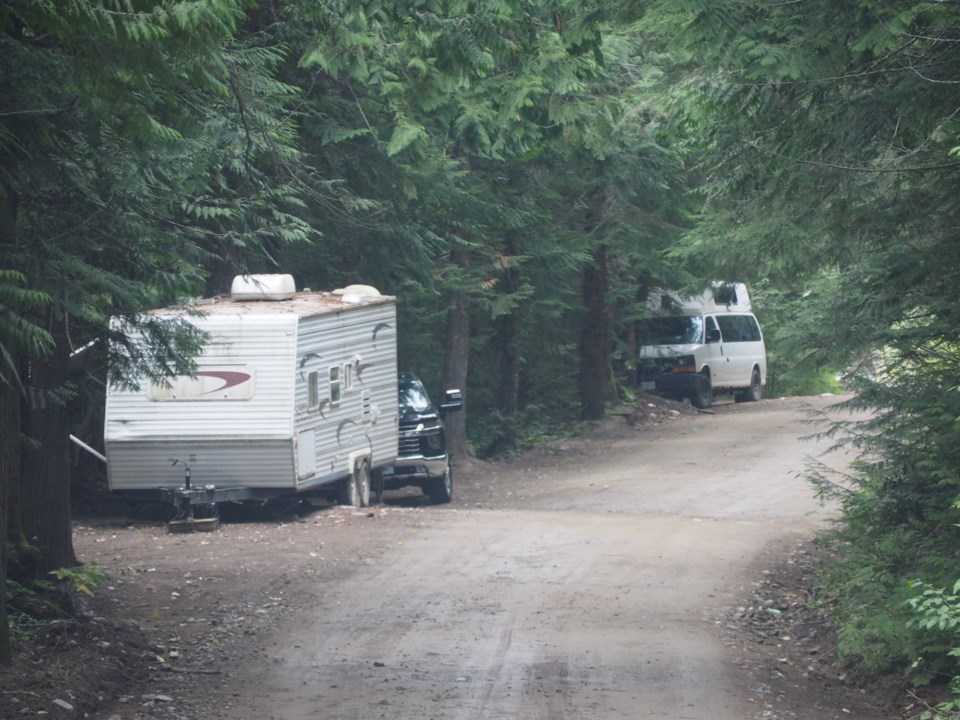Late last month, I wrote in this space about the need for compassion in addressing long-term campers on Whistler’s outskirts.
No matter where they come from or their specific reason for living out of vans and motorhomes, the people we’re talking about are human beings first and foremost—people who staff local businesses and make this town run.
Then, as if the universe wished to test my noble sentiment, a pair of them started setting up camp on my street in Whistler at night.
Let me tell you: it is difficult to practise compassion when you are face to face with a woman exiting a beat-up camper on your residential street first thing in the morning holding a bottle of what is (presumably) her own urine.
She smiles sheepishly; I can only glare back in response.
I stand by my previous words—the current state of housing in Whistler, the Sea to Sky, B.C., and Canada is beyond dismal. Affordability is a misnomer at this point, and people will do what they have to do to get by.
By the same token, I also don’t want my dog scampering through ditches lined with human poop and pee just metres from my front door.
I’ve always found NIMBYs detestable—the underlying message always being some variation of, “I got mine, screw the other guy”—and suddenly I am one.
“We must show compassion for people living in campers… just not when they’re doing it near my house! Does anyone know the number for bylaw?”
The irony is not lost on me—though I didn’t actually report anyone to bylaw.
This week, local officials, with a bevy of provincial and regional counterparts, visited several sites in and around Whistler where people have set up camp for extended stretches this summer. What comes of that exercise, and any potential next steps to address the issue, remains to be seen.
But this election season, one thing is clear: on housing and affordability, something’s gotta give, in Whistler and beyond.
According to stats presented at the Whistler Community Services Society’s (WCSS) AGM earlier this month, the dearth of affordable housing in Whistler—of any housing—is driving immense need for services.
Food bank visits are up a whopping 45 per cent this year, while the number of outreach visits jumped 30 per cent.
“The food bank was overrun during COVID. The first four months of this year, we’re serving almost three times the number of clients that we did during COVID—how is that even possible?” said outgoing WCSS board chair Steve Aikins at the AGM. “This is a town that is really struggling, and it’s a shame to see, [but] it’s also really beautiful to see how WCSS has become a rock for this community.”
You don’t have to work in social services or be some sort of math genius to know these numbers are simply not sustainable.
The risk and concern goes beyond sanitation, wildfire threat, or human mental health and safety.
According to a Sept. 18 report from the Canadian Centre for Policy Alternatives (CCPA), the lack of housing in B.C. is taking its toll on our ability to earn and prosper (to the surprise of absolutely nobody).
“Expensive housing is eroding the core of B.C.’s economy,” said CCPA senior economist Marc Lee, the report’s co-author, in a press release.
“In recent years, speculative behaviour from real estate investors has been top of mind as home prices rise beyond the reach of many households.”
The CCPA report looks at policy changes like new public investments in affordable housing, changes to exclusionary municipal zoning and restricting more-speculative forms of investment.
It considers how both supply and demand are impacting the current housing crisis, in particular the surging cost of rental housing and limited new rental housing development.
The authors conclude public and non-profit housing are needed to deliver and maintain genuine affordability (read it in full at policyalternatives.ca).
“In the context of the housing shortage, allowing new non-market and market rental apartments is crucial, particularly in the large areas of cities currently reserved exclusively for low-density housing,” said CCPA senior economist Alex Hemingway, the report’s other author, in the release.
“Where possible, land-value increases from upzoning should be used to meet affordable housing objectives, while ensuring projects remain economically viable so they actually get built.”
The BC NDP has taken drastic steps to attempt to increase housing supply province-wide through its Homes for People plan, including the small-scale, multi-unit housing zoning reforms to increase density on single-family and duplex lots.
Though the move has its detractors, in theory, the legislation has the potential to wildly increase the number of housing units being built in B.C. (much to the chagrin of NIMBYs everywhere).
For its part, the surging BC Conservative Party, led by John Rustad, has said it would revise or repeal some of the housing legislation introduced recently by the NDP.
And on Sept. 23, the Conservatives announced the B.C. Rent and Mortgage Rebate—which would allow people to deduct up to $3,000 a month for mortgage and rent payments from their income tax, at a projected cost to taxpayers of about $3.5 billion.
Somewhat lost in the policy debate is the actual impact on people and businesses. As politicians and policy wonks go back and forth with their proposals, vying for votes and influence, there is still nowhere to live.
So if you’re one of the dozens of people camping on the outskirts of Whistler, or in municipal boundaries, just trying to find a place to park and sleep for the night where you won’t be disturbed, keep fighting the good fight.
I still empathize with you. But for the love of all that is good and pure—don’t dump your piss jugs in my ditch, please.




